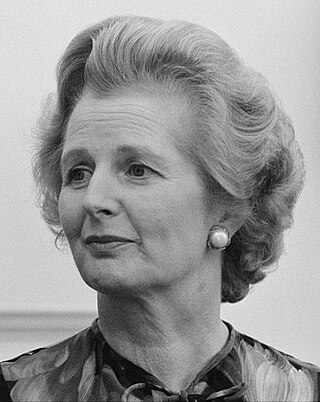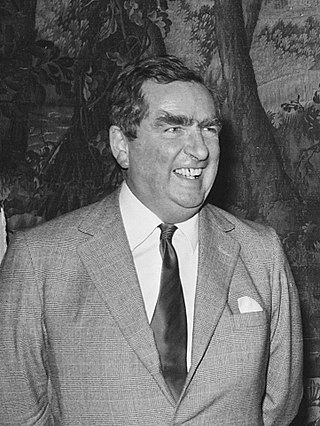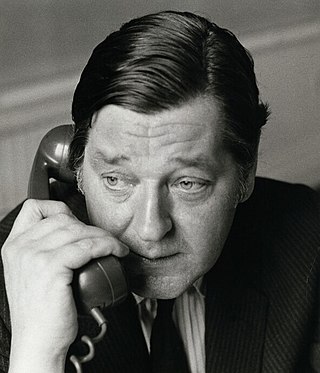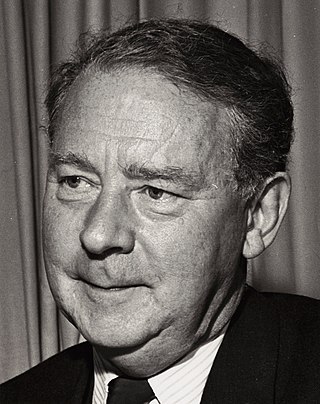
Leonard James Callaghan, Baron Callaghan of Cardiff,, commonly known as Jim Callaghan, was a British statesman and politician who served as Prime Minister of the United Kingdom from 1976 to 1979 and Leader of the Labour Party from 1976 to 1980. Callaghan is the only person to have held all four Great Offices of State, having served as Chancellor of the Exchequer from 1964 to 1967, Home Secretary from 1967 to 1970 and Foreign Secretary from 1974 to 1976. He was a Member of Parliament (MP) from 1945 to 1987.

The 1979 United Kingdom general election was held on Thursday 3 May 1979 to elect 635 members to the House of Commons.

Roy Sydney George Hattersley, Baron Hattersley, is a British politician, author and journalist from Sheffield. A member of the Labour Party, he was MP for Birmingham Sparkbrook for over 32 years from 1964 to 1997, and served as Deputy Leader of the Labour Party from 1983 to 1992.

John Smith was a British Labour Party politician who served as Leader of the Opposition and Leader of the Labour Party from July 1992 until his death from a heart attack in May 1994. He was also the Member of Parliament (MP) for Monklands East.

Denis Winston Healey, Baron Healey, was a British Labour Party politician who served as Chancellor of the Exchequer from 1974 to 1979 and as Secretary of State for Defence from 1964 to 1970; he remains the longest-serving Defence Secretary to date. He was a Member of Parliament from 1952 to 1992, and was Deputy Leader of the Labour Party from 1980 to 1983. To the public at large, Healey became well known for his bushy eyebrows, his avuncular manner and his creative turns of phrase.

George Alfred George-Brown, Baron George-Brown,, was a British Labour Party politician who served as Deputy Leader of the Labour Party from 1960 to 1970 and held several Cabinet roles under Prime Minister Harold Wilson, including Foreign Secretary and First Secretary of State.

Charles Anthony Raven Crosland was a British Labour Party politician and author. A social democrat on the right wing of the Labour Party, he was a prominent socialist intellectual. His influential book The Future of Socialism (1956) argued against many Marxist notions and the traditional Labour Party doctrine that expanding public ownership was essential to make socialism work, arguing instead for prioritising the end of poverty and improving public services. He offered positive alternatives to both the right wing and left wing of the Labour Party.

The 1959 United Kingdom general election was held on Thursday, 8 October 1959. It marked a third consecutive victory for the ruling Conservative Party, now led by Prime Minister Harold Macmillan. For the second time in a row, the Conservatives increased their overall majority in Parliament, this time to a landslide majority of 100 seats, having gained 20 seats for a return of 365. The Labour Party, led by Hugh Gaitskell, lost 19 seats and returned 258. The Liberal Party, led by Jo Grimond, again returned only six MPs to the House of Commons, but managed to increase its overall share of the vote to 5.9%, compared to just 2.7% four years earlier.
The 1983 Labour Party leadership election was an election in the United Kingdom for the leadership of the Labour Party. It occurred when then leader Michael Foot resigned after winning only 209 seats at the 1983 general election, a loss of 60 seats compared to their performance at the previous election four years earlier. This was the worst showing for Labour since 1935 until 2019.
The 1976 Labour Party leadership election occurred when Harold Wilson resigned as Leader of the Labour Party and Prime Minister. It is the only occasion when the Labour Party, whilst in government, has had a leadership election with more than one candidate.
The 1980 Labour Party leadership election was held following the resignation of James Callaghan, who had been Prime Minister from 1976 to 1979 and had stayed on as leader of the Labour Party for eighteen months in order to oversee an orderly transition to his favoured successor, Denis Healey, over his own deputy Michael Foot. However, during this period the party had become bogged down in internal arguments about its procedures and future direction.
The 1988 Labour Party leadership election saw Tony Benn, identified with the left wing of the British Labour Party, challenge the incumbent leader Neil Kinnock identified with the more moderate social democratic wing.
The 1955 Labour Party leadership election was held following the resignation of Clement Attlee. Attlee was Prime Minister from 1945 to 1951 and stayed on as party leader until he lost the 1955 general election.
The 1960 Labour Party leadership election was held when, for the first time since 1955, the incumbent leader Hugh Gaitskell was challenged for re-election. Normally the annual re-election of the leader had been a formality. Gaitskell had lost the 1959 general election and had seen the Labour Party conference adopt a policy of unilateral nuclear disarmament which he considered disastrous and refused to support. A vacancy in the deputy leadership was first made by the death of incumbent Aneurin Bevan.
The 1961 Labour Party leadership election was held when, for the second year in succession, the incumbent leader was challenged for re-election. Normally the annual re-election of the leader had been a formality.

The leader of the Labour Party is the highest position within the United Kingdom's Labour Party. The current holder of the position is Keir Starmer, who was elected to the position on 4 April 2020, following his victory in the party's leadership election.

Gaitskellism was the ideology of a faction in the British Labour Party in the 1950s and early 1960s which opposed many of the economic policies of the trade unions, especially nationalisation and control of the economy.
The 1960 Labour Party deputy leadership election took place in November 1960, after the death of sitting deputy leader Aneurin Bevan.
The 1956 Labour Party deputy leadership election took place on 2 February 1956, after the resignation of sitting deputy leader Herbert Morrison. Morrison resigned after his heavy defeat in the leadership election in December 1955, but the party decided not to hold a deputy leadership election until the new year.
The 2020 Labour Party deputy leadership election was triggered on 6 November 2019 by the resignation of Tom Watson as deputy leader of the Labour Party of the United Kingdom. It was won by Angela Rayner on the third ballot. It was held alongside the 2020 Labour Party leadership election, in which Keir Starmer was elected to succeed Jeremy Corbyn as leader.














